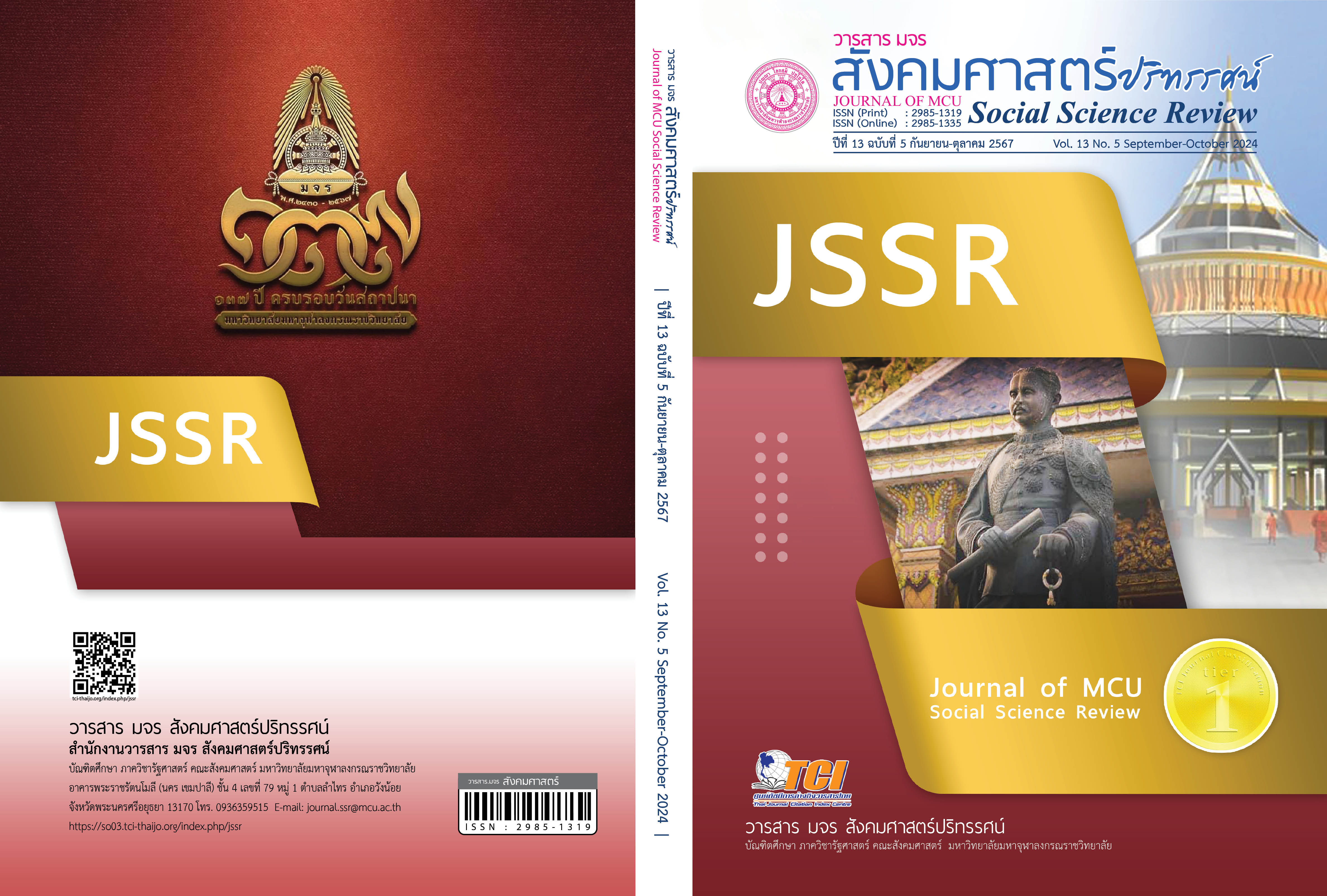การบูรณาการหลักพุทธรรมเพื่อส่งเสริมการพัฒนาคุณภาพชีวิตการปฏิบัติงานของบุคลากรเทศบาลในจังหวัดเชียงใหม่
คำสำคัญ:
การบูรณาการ, หลักพุทธรรม, การพัฒนาคุณภาพชีวิตบทคัดย่อ
บทความวิจัยนี้มีวัตถุประสงค์ 1. ศึกษาคุณภาพชีวิตการปฏิบัติงานของบุคลากรเทศบาลในจังหวัดเชียงใหม่ 2. ศึกษาปัจจัยที่ส่งผลต่อคุณภาพชีวิตการปฏิบัติงานของบุคลากรเทศบาลในจังหวัดเชียงใหม่ และ 3. นำเสนอการบูรณาการหลักพุทธธรรมเพื่อส่งเสริมการพัฒนาคุณภาพชีวิตการปฏิบัติงานของบุคลากรเทศบาลในจังหวัดเชียงใหม่ ดำเนินการตามระเบียบวิธีวิจัยแบบผสานวิธี โดยการวิจัยเชิงปริมาณใช้ แบบสอบถามที่มีค่าความเชื่อมั่นทั้งฉบับเท่ากับ 0.969 เก็บข้อมูลจากกลุ่มตัวอย่างคือ บุคลากรเทศบาลในจังหวัดเชียงใหม่ ที่กำหนดไว้ จำนวน
5 เทศบาล ในจังหวัดเชียงใหม่ จำนวน 330 คน วิเคราะห์ข้อมูลโดยหาค่าความถี่ ค่าร้อยละ ค่าเฉลี่ย ส่วนเบี่ยงเบนมาตรฐานและการวิเคราะห์โดยใช้การวิเคราะห์การถดถอยแบบขั้นตอน การวิจัยเชิงคุณภาพใช้วิธีการสัมภาษณ์เชิงลึกกับผู้ให้ข้อมูลสำคัญ จำนวน 18 รูปหรือคน
แบบตัวต่อตัว วิเคราะห์ข้อมูลโดยการวิเคราะห์เนื้อหาเชิงพรรณนาและการสนทนากลุ่มเฉพาะจำนวน 9 รูปหรือคน เพื่อยืนยันองค์ความรู้หลังจากการสังเคราะห์ข้อมูล
ผลการวิจัยพบว่า 1. คุณภาพชีวิตการปฏิบัติงานของบุคลากรเทศบาลในจังหวัดเชียงใหม่ โดยภาพรวม อยู่ในระดับมาก มาก เมื่อพิจารณาเป็นรายด้าน พบว่า อยู่ในระดับมากทุกด้าน จากผลการสัมภาษณ์สามารถสรุปได้ดังนี้ การสนับสนุนการพัฒนาทักษะและความรู้ การสนับสนุนค่าตอบแทนและสวัสดิการที่เป็นธรรม 2. ปัจจัยที่ส่งผลต่อคุณภาพชีวิต
การปฏิบัติงานของบุคลากรเทศบาลในจังหวัดเชียงใหม่ พบว่า ปัจจัยที่ส่งผลต่อคุณภาพชีวิตการปฏิบัติงานและหลักภาวนา 4 มี 2 ด้าน มีนัยสำคัญทางสถิติที่ระดับ 0.01 3. การบูรณาการหลักพุทธธรรมเพื่อส่งเสริมการพัฒนาคุณภาพชีวิตการปฏิบัติงานของบุคลากรเทศบาลในจังหวัดเชียงใหม่ 1. กายภาวนา ช่วยสร้างสมดุลในชีวิตส่วนตัวและการทำงานสนับสนุนให้มี Work-life Balance 2. ศีลภาวนา ช่วยสร้างวินัยและความรับผิดชอบ 3. จิตตภาวนา ช่วยให้การทำงานที่มีประสิทธิภาพ 4. ปัญญาภาวนา เสริมสร้างความเข้มแข็งทางความคิดริเริ่มสร้างสรรค์งาน
เอกสารอ้างอิง
นัฐพล บุญสอน. (2566). การประยุกต์หลักภาวนา 4 เพื่อส่งเสริมคุณภาพชีวิตในการปฏิบัติงานของบุคลากรสำนักงานเลขาธิการวุฒิสภา (ดุษฎีนิพนธ์ปรัชญาดุษฎีบัณฑิต สาขาวิชารัฐประศาสนศาสตร์). พระนครศรีอยุธยา: มหาวิทยาลัยมหาจุฬาลงกรณราชวิทยาลัย.
นิยม สิงห์โห. (2558). ยุทธศาสตร์การบริหารการพัฒนาคุณภาพชีวิตตามแนวพุทธวิธีของทหาร กองประจำการกองบัญชาการศูนย์การทหารม้า (ดุษฎีนิพนธ์พุทธศาสตรดุษฎีบัณฑิต สาขาวิชารัฐประศาสนศาสตร์) พระนครศรีอยุธยา: มหาวิทยาลัยมหาจุฬาลงกรณราชวิทยาลัย.
บุญทัน ดอกไธสง.(2562). กรณีศึกษา : ตัวแบบ K.S.M.เอกสารการเรียนวิชาสัมมนาองค์กรและการจัดการสมัยใหม่. พระนครศรีอยุธยา: มหาวิทยาลัยมหาจุฬาลงกรณราชวิทยาลัย.
พระพรหมคุณาภรณ์ (ป.อ. ปยุตฺโต). (2556). วิธีคิดตามหลักพุทธธรรมโยนิโสมนสิการ (พิมพ์ครั้งที่ 24). กรุงเทพฯ: ปัญญาประดิษฐาน.
รัตนา ตฤษณารังสี. (2565). การส่งเสริมคุณภาพชีวิตตามแนวพุทธธรรมาภิบาลของแรงงานไทยสภาองค์การนายจ้าง เอส.เอ็ม.อี แห่งประเทศไทย (ดุษฎีนิพนธ์ปรัชญาดุษฎีบัณฑิต สาขาวิชารัฐประศาสนศาสตร์). พระนครศรีอยุธยา: มหาวิทยาลัยมหาจุฬาลงกรณราชวิทยาลัย.
สำนักการศึกษาศาสนาและวัฒนธรรม องค์การบริหารส่วนจังหวัดเชียงใหม่. (2566). แผนพัฒนาการศึกษา (พ.ศ. 2566 - 2570) ขององค์กรปกครองส่วนท้องถิ่นในเขตจังหวัดเชียงใหม่. สืบค้น 21 พฤศจิกายน 2566, จาก https://shorturl.asia/l3mGE
สำนักงานส่งเสริมการปกครองส่วนท้องถิ่นจังหวัดเชียงใหม่. (2566). ข้อมูลบุคลากร. สืบค้น 26 ตุลาคม2566, จาก https://chiangmailocal.go.th/index.php
สุรพล สุยะพรหม และสุทธิรัก ศรีจันทร์เพ็ญ. (2553). ระเบียบวิธีวิจัยทางการจัดการ. กรุงเทพฯ: มหาวิทยาลัยมหาจุฬาลงกรณราชวิทยาลัย.
ดาวน์โหลด
เผยแพร่แล้ว
รูปแบบการอ้างอิง
ฉบับ
ประเภทบทความ
สัญญาอนุญาต
ลิขสิทธิ์ (c) 2024 วารสาร มจร สังคมศาสตร์ปริทรรศน์

อนุญาตภายใต้เงื่อนไข Creative Commons Attribution-NonCommercial-NoDerivatives 4.0 International License.
เพื่อให้เป็นไปตามกฎหมายลิขสิทธิ์ ผู้นิพนธ์ทุกท่านต้องลงลายมือชื่อในแบบฟอร์มใบมอบลิขสิทธิ์บทความให้แก่วารสารฯ พร้อมกับบทความต้นฉบับที่ได้แก้ไขครั้งสุดท้าย นอกจากนี้ ผู้นิพนธ์ทุกท่านต้องยืนยันว่าบทความต้นฉบับที่ส่งมาตีพิมพ์นั้น ได้ส่งมาตีพิมพ์เฉพาะในวารสาร มจร สังคมศาสตร์ปริทรรศน์ เพียงแห่งเดียวเท่านั้น หากมีการใช้ภาพหรือตารางหรือเนื้อหาอื่นๆ ของผู้นิพนธ์อื่นที่ปรากฏในสิ่งตีพิมพ์อื่นมาแล้ว ผู้นิพนธ์ต้องขออนุญาตเจ้าของลิขสิทธิ์ก่อน พร้อมทั้งแสดงหนังสือที่ได้รับการยินยอมต่อบรรณาธิการ ก่อนที่บทความจะได้รับการตีพิมพ์ หากไม่เป็นไปตามข้อกำหนดเบื้องต้น ทางวารสารจะถอดบทความของท่านออกโดยไม่มีข้อยกเว้นใดๆ ทั้งสิ้น





